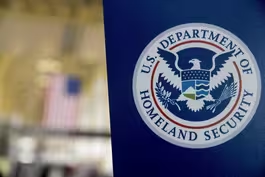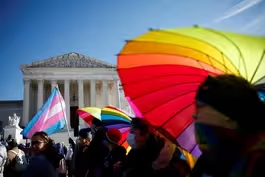
States agree to Purdue Pharma settlement over opioid crisis
Clip: 6/18/2025 | 5m 58sVideo has Closed Captions
U.S. states agree to multi-billion dollar settlement with Purdue Pharma over opioid crisis
A historic and national $7.4 billion dollar settlement has been reached with Purdue Pharma, the maker of the opioid OxyContin that spurred a major start of the opioid epidemic. A prior settlement had been struck down by the Supreme Court. NPR'S national addiction correspondent, Brian Mann, joins Lisa Desjardins with more.
Problems playing video? | Closed Captioning Feedback
Problems playing video? | Closed Captioning Feedback
Major corporate funding for the PBS News Hour is provided by BDO, BNSF, Consumer Cellular, American Cruise Lines, and Raymond James. Funding for the PBS NewsHour Weekend is provided by...

States agree to Purdue Pharma settlement over opioid crisis
Clip: 6/18/2025 | 5m 58sVideo has Closed Captions
A historic and national $7.4 billion dollar settlement has been reached with Purdue Pharma, the maker of the opioid OxyContin that spurred a major start of the opioid epidemic. A prior settlement had been struck down by the Supreme Court. NPR'S national addiction correspondent, Brian Mann, joins Lisa Desjardins with more.
Problems playing video? | Closed Captioning Feedback
How to Watch PBS News Hour
PBS News Hour is available to stream on pbs.org and the free PBS App, available on iPhone, Apple TV, Android TV, Android smartphones, Amazon Fire TV, Amazon Fire Tablet, Roku, Samsung Smart TV, and Vizio.
Providing Support for PBS.org
Learn Moreabout PBS online sponsorshipGEOFF BENNETT: An historic $7.4 billion settlement has been reached with Purdue Pharma, the maker of OxyContin, the drug widely seen as a key driver of the opioid epidemic.
A prior settlement had been struck down by the Supreme Court.
Our Lisa Desjardins has the update.
LISA DESJARDINS: Geoff, the opioid crisis grew out of Purdue Pharma's work.
And while related deaths have declined, it is still a lethal problem.
Last year, more than 50,000 Americans died from overdose involving opioids.
Now all 50 states, plus the District of Columbia and four U.S. territories, have signed on to a new settlement.
If approved by courts and the Department of Justice, it would end the Sacklers' ownership of Purdue and begin payouts to families and communities devastated by the crisis.
Joining me now for more is NPR's national addiction correspondent, Brian Mann.
Thank you, Brian, for joining us.
And help us understand, first of all, where would this money go and how soon could communities feel it?
BRIAN MANN, National Addiction Correspondent, National Public Radio: Yes.
The money will start moving as soon as this deal is consummated.
People have been telling me that could happen as early as next year, which seems like a long time, but after years and years of legal wrangling, that's pretty fast.
The Sacklers would have to pay about 1.4 -- $1.5 billion right out of the gate.
The company would also pony up money.
And a lot of this money would go to addiction treatment and health care programs around the country.
Some of the money would go directly to families and victims of OxyContin, Purdue Pharma's premier product, highly addictive pain medication.
And this money would then be paid out over the next 15 years, a big pot of money right at the beginning, and then more money would go into the system over the next decade-and-a-half.
LISA DESJARDINS: You said years of wrangling.
This really has been a legal and emotional roller coaster, especially over the last five years.
One settlement was rejected by the courts, one big one.
Why is this one different?
BRIAN MANN: There's a huge change here.
The deal that was struck down by the U.S. Supreme Court last summer had a provision that forced everyone to give up lawsuits directed at members of the Sackler family, who currently own this company.
There are a lot of people suing members of the family who want their day in court, people who've said they don't want to give up their lawsuits.
That last deal included a really powerful legal provision that would have struck down all of those cases.
The Supreme Court said bankruptcy courts and dealmakers didn't have that authority.
That sent everybody back to the negotiating table.
So, in this deal, at least the way that this would work is that only people who drop their lawsuits can participate in this settlement, can benefit financially from this settlement.
But if people want to stay aside from this deal, they can keep those lawsuits going in court.
Of course, the big players are sort of laying down their litigation here.
That's the states and the U.S. territories that have now signed on.
But the Sacklers over time could still face a lot of litigation from a lot of individuals who say they were harmed.
LISA DESJARDINS: Do you think this one will stick?
BRIAN MANN: Everybody we have been talking to says this deal is going to go through.
Of course, anything could change in a deal this complex.
But a couple of big things have changed here.
First, that legal provision that I just mentioned, that's a deal changer, fundamentally less controversial now.
The other thing that's really important to understand here is that the Justice Department now is very different than it was a year ago under the Biden administration.
Everyone I talked to says the Trump administration's DOJ has shown no appetite for wading into the middle of this deal and disrupting it.
LISA DESJARDINS: I want to talk more on personal grounds, though.
You spoke to some families that don't like this deal.
What is the criticism?
BRIAN MANN: Well, very simply, this deal benefits communities, states, counties, Native tribes much more than it does individual victims.
Advocates say that's cool because it means money is going to go to protecting people in the future, right, preventing addiction, healing people who are currently addicted, helping people still caught up in the fentanyl crisis that's raging across the United States.
That's going to be -- most of the $7.4 billion will go to that kind of work.
But that means only about $850 million will go to people who were devastated by OxyContin, people who lost family members to fatal overdoses, people who lost years of their own lives to this.
Some of them say they will only get a few thousand dollars in compensation out of this deal; $850 million sounds like a lot of money, but when you divide it up over all the people who say that they were addicted or lost loved ones, you slice that pie thinner and thinner.
Some people will walk away with hundreds of dollars, a few thousand dollars, and some people are really angry about that level of payout.
LISA DESJARDINS: I want to close just in our last few seconds on the Sacklers.
Where do they and their fortune stand now?
BRIAN MANN: Well, they're one of the wealthiest families in the United States.
They will remain one of the wealthiest families in the United States.
This money will be a hit to their collective pocketbooks, but they will be allowed to pay out the funds over a decade-and-a-half.
And so this will sting.
And they are still vulnerable to those lawsuits that could come in the future, but a lot of people say that this isn't the justice that they were hoping for.
Again, the Sacklers deny wrongdoing.
They say they led this company ethically, even though it pleaded guilty repeatedly to criminal activity on their watch.
But they're going to walk away from this with a lot more legal protection and a lot of their fortune intact.
LISA DESJARDINS: NPR's Brian Mann, thank you for covering this and for joining us.
BRIAN MANN: Thanks for having me.
Biography documents life of pioneering LGBTQ rights activist
Video has Closed Captions
Clip: 6/18/2025 | 6m 12s | New biography documents life of pioneering LGBTQ rights activist Marsha P. Johnson (6m 12s)
Homeland Security official on Trump's immigration policy
Video has Closed Captions
Clip: 6/18/2025 | 9m 28s | Homeland Security official on the Trump administration's immigration policy changes (9m 28s)
How misinformation spread after Minnesota lawmaker's murder
Video has Closed Captions
Clip: 6/18/2025 | 6m 58s | How misinformation spread after Minnesota lawmaker's murder (6m 58s)
Iran rejects Trump's calls for surrender amid Israeli attack
Video has Closed Captions
Clip: 6/18/2025 | 3m 27s | Iran rejects Trump's calls for surrender amid Israel's ongoing bombardment (3m 27s)
Israel's attack on Iran puts the U.S. in a difficult spot
Video has Closed Captions
Clip: 6/18/2025 | 7m 33s | How Israel's attack on Iran puts the U.S. in a difficult situation (7m 33s)
Supreme Court upholds law banning gender-affirming care
Video has Closed Captions
Clip: 6/18/2025 | 8m 1s | Supreme Court upholds Tennessee law banning gender-affirming care for transgender minors (8m 1s)
Providing Support for PBS.org
Learn Moreabout PBS online sponsorship
- News and Public Affairs

FRONTLINE is investigative journalism that questions, explains and changes our world.

- News and Public Affairs

Amanpour and Company features conversations with leaders and decision makers.












Support for PBS provided by:
Major corporate funding for the PBS News Hour is provided by BDO, BNSF, Consumer Cellular, American Cruise Lines, and Raymond James. Funding for the PBS NewsHour Weekend is provided by...





